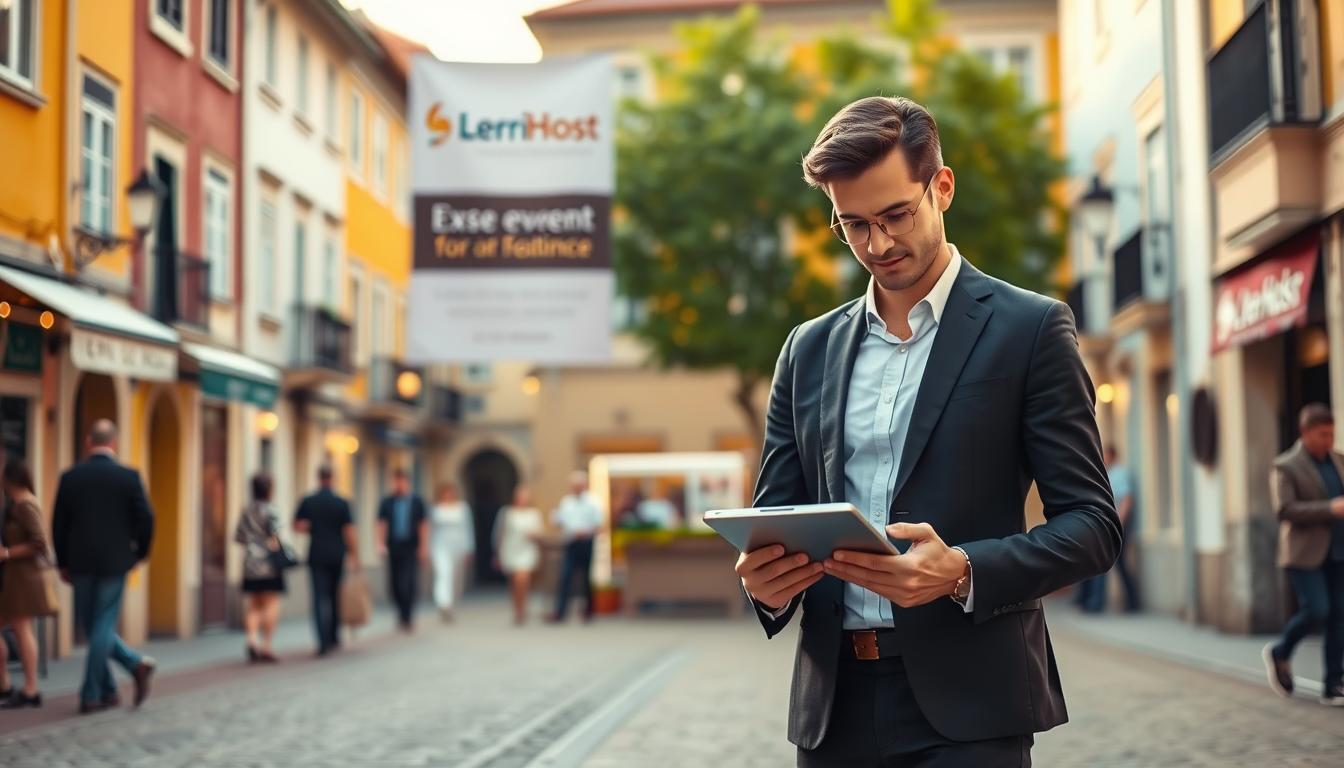Starting a career in event planning in Portugal is a chance to mix creativity with the country’s lively culture and stunning views. We’ll look into the world of event management in Portugal. There are many options, from big corporate events to weddings. Companies like LerriHost help us set up our business and follow local rules.
Let’s explore how to become a top event planner in this beautiful country. It’s all about hard work and loving to make unforgettable moments.
Understanding the Role of an Event Planner
In the world of event planning, we handle many tasks. We manage events like weddings, corporate gatherings, festivals, and private parties. Each event is different, so we need to be flexible and pay attention to details to make sure everything goes well.
What Does an Event Planner Do?
We take care of everything from the start to the end of an event. This includes planning, setting budgets, choosing venues, and working with vendors. We talk to clients to get their ideas and make them happen. This means planning carefully, making timelines, and managing the event on the day to meet the client’s wishes.
Essential Skills for Event Planners
To do well in this job, we develop important skills. These include:
- Project Management: Organising tasks well to meet deadlines.
- Communication: Talking clearly with clients, vendors, and our team.
- Negotiation: Getting good deals to keep costs down.
- Problem-Solving: Finding quick solutions to unexpected problems.
Types of Events Managed by Planners
We get to work on many different types of events. Some common ones are:
- Weddings: Creating special days for couples in love.
- Corporate Events: Organising meetings, launches, and team activities.
- Festivals: Running big events that celebrate culture or community.
- Private Parties: Planning parties for birthdays, anniversaries, and more.
Why Choose Portugal for Event Planning?
Planning events in Portugal is a great chance to make unforgettable memories. The country has many unique venues, a rich culture, and beautiful landscapes. These make Portugal a top pick for hosting events.
Unique Venue Options in Portugal
Portugal has a wide range of venues for any event. You can find majestic castles in the countryside or stunning vineyards in the Douro Valley. Beachfront resorts along the Algarve coast are perfect for weddings and business meetings.
Each venue has its own special charm. This lets us create unique atmospheres that match what our clients want.
Cultural Richness and Heritage
Portugal’s cultural heritage is a big reason to choose it for events. Traditional music like Fado and lively festivals offer a true taste of Portuguese culture. Adding these cultural touches makes events more special for everyone.
Scenic Locations and Climate
Portugal’s mild climate and beautiful landscapes are ideal for outdoor events all year. The Alentejo region’s greenery and the coastline’s cliffs are stunning. The weather is perfect for outdoor gatherings, making every event enjoyable.
Getting Started as an Event Planner
Starting a career in event planning requires careful steps. We’ll look at the qualifications and training needed. We’ll also talk about the importance of networking and finding the right niche in Portugal.
Necessary Qualifications and Training
To start as an event planner, getting the right qualifications is key. Many places offer courses in event management. These courses teach us practical skills and the latest industry trends.
Building a Professional Network
Networking is vital for a successful event planning career. Meeting other planners, vendors, and industry experts is essential. Going to events, workshops, and conferences helps us build valuable connections. These connections can lead to new opportunities and help us grow in the market.
Finding Your Niche in Event Planning
Finding a specific area to focus on can make a big difference. With so many types of events, choosing one helps us stand out. By focusing on what we’re good at and what’s in demand, we can build a strong reputation.
The Event Planning Process
Knowing the event planning process is key to hosting great events. It starts with talking to clients and ends with picking vendors. Each step is vital for a memorable experience. We’ll walk you through these stages, making sure we meet our clients’ needs and stay within budget.
Initial Consultation with Clients
The first meeting with clients is the start of our journey. It’s where we talk openly and find out what they want. We ask important questions like:
- What’s the event’s purpose?
- Who will be there?
- What do you hope to achieve?
- When and where do you want it to happen?
Answering these helps us plan better for the next steps.
Budgeting and Financial Management
Budgeting is a big part of planning a successful event. We make a detailed financial plan that covers all costs. This includes venue, food, and entertainment. Good budgeting helps us stay on track and meet our clients’ wishes without spending too much. Here’s how we budget:
- We list and group all expenses.
- We estimate costs for each group.
- We keep an eye on spending as we plan.
Sticking to a budget lets us make smart choices and keep the client’s dream alive.
Vendor Selection and Coordination
The last step is choosing and working with vendors. It’s important to find vendors who fit our clients’ style. We follow these steps:
- We look for vendors and read their reviews.
- We interview them to see if they’re a good fit.
- We negotiate contracts and manage our relationships with them.
By carefully choosing and coordinating vendors, we make sure everything works together perfectly for a memorable event.
Legal Requirements for Event Planning in Portugal
Understanding the legal rules is key for event planning in Portugal. Following these laws ensures our events run smoothly and our clients are happy. Knowing what’s required helps us avoid problems and plan with confidence.
Licensing and Permits
To work as an event planner in Portugal, we need the right licences and permits. These vary based on the event type, like weddings or corporate events. It’s wise to get these permits early to avoid any last-minute issues.
Insurance Needs for Event Planners
Insurance is vital for protecting our business from unexpected problems. Liability insurance covers us if accidents or damage happen at events. Also, event cancellation insurance can give us peace of mind, which is important for big events.
Local Regulations to Consider
Knowing the local rules is important for following the law and running smoothly. These rules might cover things like noise limits, public safety, and health and safety. Being up to date with these helps us plan events that meet our clients’ needs and follow the law.
| Requirement | Description | Importance |
|---|---|---|
| Licenses | Official permissions to operate an event planning business. | Mandatory for legal operation. |
| Permits | Specific approvals based on event type and location. | Prevents legal issues during events. |
| Liability Insurance | Protection against claims from accidents or damages. | Essential for financial security. |
| Event Cancellation Insurance | Coverage if an event cannot proceed as planned. | Minimises financial losses. |
| Health and Safety Regulations | Compliance with local safety standards. | Ensures the safety of attendees. |
Creating Memorable Experiences
In event planning, our goal is to create unforgettable moments. A well-designed event does more than look good. It sets the mood and engages guests from the start. With careful themes and designs, we make every experience special.
The Importance of Theme and Design
A strong theme is the heart of an event, linking everything from invites to decor. We use colours, lighting, and furniture to tell our story. This unified design makes the event unforgettable for our guests.
Personalizing Events for Clients
Knowing what clients want is key in event planning. We tailor events to match their style, making them feel connected. Small details like custom favours or messages show we care, making guests feel valued.
Engaging Guests Through Unique Activities
Unique activities are vital for keeping guests engaged. They not only entertain but also create lasting memories. From workshops to live shows, we aim to leave a lasting impact on our guests.
Leveraging Technology in Event Planning
In today’s fast world, using technology in event planning is key. We can make planning easier with event software and tools. This helps us stay organised and efficient. With more virtual events, knowing how to use these tools is vital.
We’ll look at the tools out there, how to manage different event types, and how to use social media to reach more people.
Event Planning Software and Tools
Specialised event planning software can change how we work. It helps with scheduling, budgeting, and managing guests. The main benefits are:
- Automated scheduling and reminders, reducing the risk of oversights.
- Budget tracking features help maintain financial control.
- Guest management capabilities simplify RSVP and check-in processes.
Virtual and Hybrid Event Solutions
Virtual and hybrid events have changed event planning. They let us reach more people without being limited by location. To manage virtual events well, we need:
- Platforms that support live streaming and interaction.
- Engaging content formats, like webinars and panel discussions.
- Ensuring accessibility for all attendees.
Using Social Media for Promotion
Social media is great for promoting events and connecting with our audience. By using it wisely, we can get more people to know about our events. Good strategies include:
- Creating event pages on popular platforms like Facebook and LinkedIn.
- Using targeted ads to reach specific groups.
- Encouraging people to share their experiences.
| Event Type | Technology Used | Benefits |
|---|---|---|
| In-person Events | Event management software | Improved organisation and attendee tracking |
| Virtual Events | Webinar platforms | Global reach and flexibility |
| Hybrid Events | Live streaming tools | Engagement from both in-person and online audiences |
Marketing Yourself as an Event Planner
Marketing is key for event planners to stand out in a crowded field. We must build a portfolio that shows off our style and success. This portfolio is our marketing base, drawing in clients and partners.
Having a strong online presence is also important. We use social media to boost our brand and connect with people. Networking at events and expos is another way to meet others in our field and find new clients.
Building an Impressive Portfolio
Creating a portfolio takes careful selection and presentation of our work. It should include a variety of events to show our range. Adding client feedback and quality images makes us look credible and versatile.
A good portfolio should have:
- Detailed descriptions of events managed
- Visuals of designs and setups
- Feedback from clients
- References for future clients
Utilising Social Media Platforms
Social media is vital for our online presence. We share content that speaks to our audience, showing our personality and event planning style. Instagram and Facebook are great for posting visuals, testimonials, and event news.
By regularly posting and engaging with followers, we grow our audience and build a brand community.
Networking at Industry Events and Expos
Networking at events and expos is a chance to meet peers and clients. Workshops, seminars, and trade shows are learning hubs and platforms for us to showcase our skills. Building relationships with vendors and planners can lead to great partnerships.
Sharing ideas and resources at these events boosts our industry standing. It makes us known as a reliable event planner.
| Marketing Strategies | Description | Benefits |
|---|---|---|
| Building a Portfolio | Showcases past work, including designs and client testimonials. | Attracts clients, enhances credibility. |
| Social Media Engagement | Utilises platforms to share content and interact with followers. | Increases brand visibility and fosters community. |
| Industry Networking | Connects with professionals at events and expos. | Facilitates collaborations and enriches our professional network. |
Establishing Partnerships and Collaborations
As event planners, we know that strong relationships make our events better. Building partnerships is more than just adding services. It’s about creating a great experience for everyone involved. Working well with vendors means we can offer top-notch service and creative solutions.
Partnering with Local Vendors
Working with local vendors is key. They know the best local products and services. This helps us offer great value and support the community. Plus, it can lead to better prices and a reliable network for busy times.
Collaborating with Venues and Caterers
Our relationship with venues is very important. Working with venue managers helps us plan the best events. Caterers add a special touch with local food, making our events unique.
Joining Professional Associations
Being part of professional associations has many benefits. They offer resources, education, and chances to meet others in the field. Sharing knowledge and ideas helps us grow and improve together.
Understanding Client Expectations
In event planning, knowing what clients want is key to success. We build strong bonds with our clients by talking clearly and listening well. This makes them feel important and understood, helping us plan better.
Effective Communication Strategies
We use smart ways to keep clients in the loop and involved. We send regular updates, talk openly, and listen carefully. Tools like emails, meetings, and shared platforms help us stay close and build trust.
Setting Realistic Goals and Timelines
It’s important to set goals and timelines that are reachable. Talking about what we aim to do helps us plan together. Breaking tasks into smaller steps keeps us focused and lets clients see how their event is coming along.
Addressing Client Feedback and Concerns
Listening to what clients say is a big part of our work. We want to hear their thoughts and worries. By using feedback, we can improve and solve problems fast, making our service better and our relationship stronger.
Managing Challenges in Event Planning
In the world of event planning, we face many challenges. Last-minute changes can upset our plans. Managing our budget well is key, as overspending can harm our projects.
Knowing how to handle crises is also important. This skill helps us deal with unexpected problems during events. By tackling these challenges, we improve our work and create unforgettable experiences.
Handling Last-Minute Changes
Being flexible is essential in our job. We often have to make changes just before an event. These can include changes to guest lists, venues, or supplier deals.
To handle these changes well, we need to talk clearly with everyone involved. Having backup plans helps us act fast. Keeping our clients updated builds trust and teamwork.
Budget Overruns and Resource Management
Managing our budget is a big part of planning. We must stay within our budget while delivering great events. Keeping track of spending helps us catch any overspending early.
Using our resources wisely is also key. We can save money by negotiating with vendors and using our own team when we can. This way, we can keep our events successful without spending too much.
Crisis Management Techniques
Unexpected problems can happen during events. That’s why crisis management is so important. Having a good risk management plan helps us prepare for issues.
Training our team to handle crises quickly is also vital. After an event, we review what worked and what didn’t. This helps us get better at managing challenges and facing crises confidently.
Continuing Education and Growth Opportunities
In the fast-changing world of event planning, keeping up with new trends is key. We know that learning new things helps us create better events. This makes us more skilled and ready to meet our clients’ needs.
Staying Updated on Industry Trends
We must always look for the latest news in event planning. This means keeping up with new tech, event styles, and what clients want. By doing this, we can make our events stand out and give our clients unforgettable experiences.
Attending Workshops and Conferences
Going to workshops and conferences is also important for growing. These events share the newest ideas and let us meet others in the field. By joining in, we can share ideas, learn from others, and make valuable connections.
Pursuing Certifications and Advanced Training
Getting event planning certifications and extra training is also a good idea. These show we’re serious about our work and add to our skills. This can open up new chances and make our clients happier with what we do.







